



Key geopolitical themes and drivers





2020 was a year of uncertainty defined by the global health
and economic challenge of the coronavirus (COVID-19) pandemic.
Looking ahead to the critical issues that are likely to shape the landscape in coming years, tackling the pandemic will remain a primary priority for governments and leadership around the world. Yet, as post-pandemic geopolitics takes shape, a host of long-standing questions will again take center-stage alongside an emerging set of questions arising out of the global pandemic experience.







After a worldwide research and development race in 2020, multiple vaccines targeting the coronavirus (COVID-19) are now available for deployment with dozens more in a pipeline of clinical trials.
Read

Hear

Watch

Experts



Vaccine rollout
Lindsay Newman
Milena Izmirlieva
Deepa Kumar
Gustav Ando
While unknowns remain – duration of vaccine protection, efficacy against virus transmissions – countries face an enormous task to vaccinate their population against the COVID-19 pandemic at a scale and pace to drive forward their health, social and economic recoveries.
While unknowns remain – duration of vaccine protection, efficacy against virus transmissions – countries face an enormous task to vaccinate their population against the COVID-19 pandemic at a scale and pace to drive forward their health, social and economic recoveries. Countries are facing a set of shared challenges in their vaccine campaigns including over-reliance on external sources of vaccine supply, gaps between sufficient supply and effective rollout, vaccine producers leveraging “vaccine diplomacy” and delays in vaccinations threatening civil unrest and political stability.
https://ihsmarkit.com/research-analysis/geopolitics-of-covid19-vaccine-campaigns-shared-challenges.html
Update on the COVID-19 vaccine landscape and the economic and risk outlook for 2021
Episode 79: COVID-19 vaccine rollout
across the Asia-Pacific region
Geopolitics of COVID-19 Vaccine Campaigns: Shared challenges




Countries face looming public debt crises arising out of demands to support domestic economies.
Read

Hear

Watch

Experts

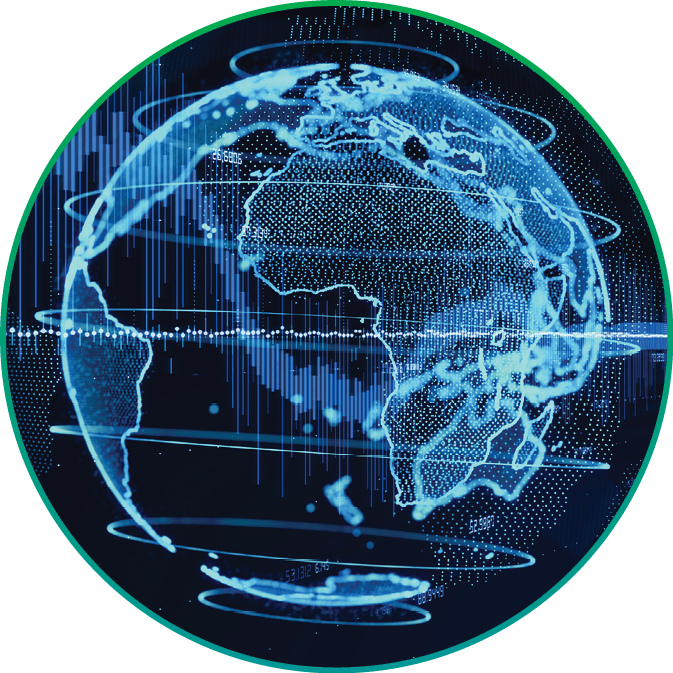
Learn


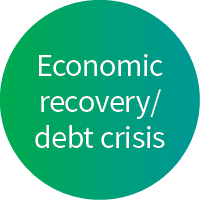
Chris Suckling
Brian Lawson
Theophilus Acheampong
Ken Wattret
IMF conditionality after the COVID-19 pandemic
Episode 64: Fiscal austerity, the IMF, and the G20: Holding off another lost decade?
On the Horizon
Banking Risk
According to our economic forecasts, a number of countries are likely to struggle with public debt to GDP ratios for the foreseeable future, and yet for regions like the eurozone, IHS Markit sees a resurgence of the multi-faceted crisis of 2010-2012 in the near term as unlikely. With IHS Markit forecasting global economic growth strengthening in 2021 and 2022, how sustainable public debt levels are, where vulnerabilities are likely to resurface and what policies governments pursue to tackle their fiscal health challenges (including timelines for any austerity measures),
will be a fundamental question in the year(s) ahead.



Recent years have seen civil unrest driven in part by economic dislocation and historical inequities.
Read

Watch

Experts


Learn


Jack Kennedy
Blanka Kolenikova
Carlos Cardenas
Incidence of unrest has also coincided with the apparent expansion of both right- and left-wing movements. With public debt at historic levels for a number of countries exiting 2020, on-going likelihood of unrest remains, posing political risks including around business disruption and government stability. According to IHS Markit analysis, Iraq, Iran and Lebanon represented key hotpots for unrest in the Middle East and North Africa through 2020 while France, Russia and Bulgaria led the number of incidents in Europe. Moving forward, where are likely hotspots of protest activity in the years ahead? As vaccine campaigns roll out and the pandemic begins to potentially recede,
will we see regional patterns of civil unrest as we did in 2019 around unresolved economic and political grievances in the Middle East and North Africa or as anti-government protests in Latin America? And how can incident metadata help navigate these often rapidly evolving situations?
https://ihsmarkit.com/products/corporate-national-security-risk.html
Another year of discontent? Outlook for civil unrest in 2021 and learning from the data
Terrorism in the Philippines: Examining the data and what to expect in the coming years
Corporate and National Security



The Biden administration will pursue a policy agenda (both at home and abroad) that diverges from the priorities of the prior Trump presidency.
Read

Watch


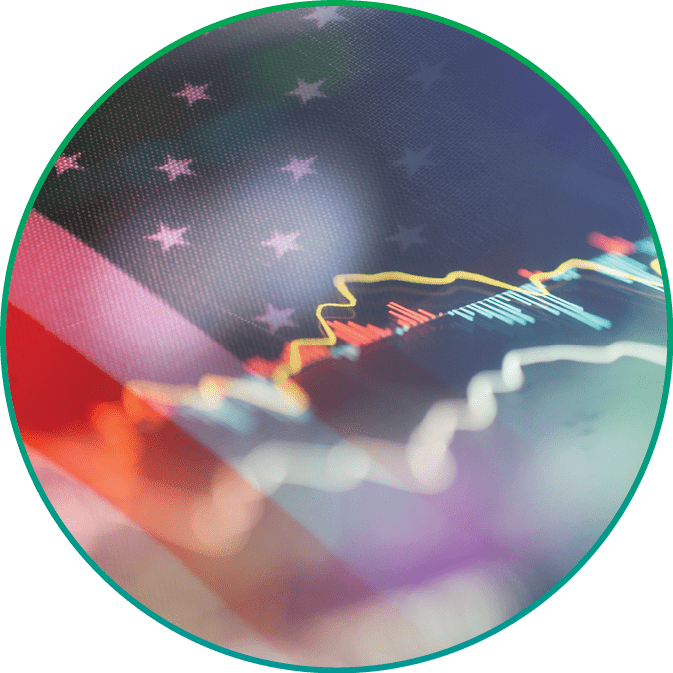
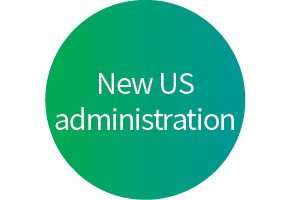
Experts
Joel Prakken
Chris Varvares
Margaret Labban
https://event.on24.com/wcc/r/2930708/C0D738A6CDF587DCC3332273CC6669B7?partnerref=RiskThemes
Building on the successful passage of the American Rescue Plan, the administration’s domestic policy priorities are likely to include infrastructure, climate, economic inequities, immigration, and education. On the world stage, Biden will look to reenergize diplomacy and multilateralism,including on trade. Biden has called for a Global Summit for Democracy, for the US to lead on the climate agenda (the US has already re-joined the Paris Climate Agreement), he would see the US revive the Iran Nuclear Deal as part of a conditioned re-entry, and strengthen alliances in Asia to offset competition with China including through the Quadrilateral Security Dialogue with India, Australia and Japan.
Did the US section 301 tariffs work?
Critical geopolitics – what to watch in 2021
Lindsay Newman
John Raine



Sino-US relations will likely be the strategic relationship challenge of our times that we will all be watching with a close eye in coming years.
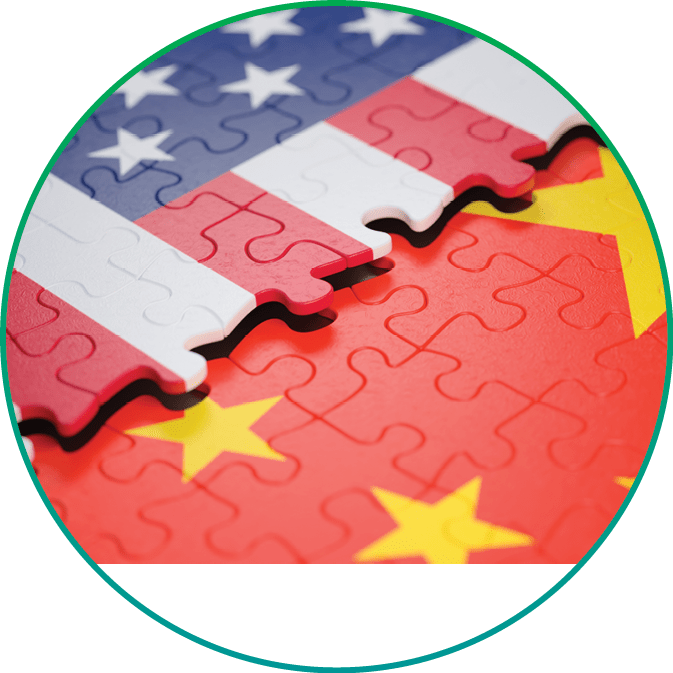

Read

Hear

Watch


Learn

Experts
John Raines
David Li
Jonathan Ablett
Todd Lee
Rajiv Biswas
Hear
Episode 81: Sovereign level ESG in Latin America 
Despite the differences in foreign policy broadly under Trump’s America First doctrine and Biden’s renewed multilateralism, renewed diplomacy approach, there is closer bipartisan alignment around the US adopting a tougher stance on China. The main points of contention in the US-China relationship are likely to be around trade, currency, investment and technology along with key security risks and sensitive issue areas. How other global players such as Europe engage with both the US and China, and counterbalance the strategic competition between them, will be a development IHS Markit will be tracking in the year ahead.
https://ihsmarkit.com/products/US-China-decoupling-business-strategy.html
US-China Decoupling:
Where will we land?
Episode 77: China’s Economic Outlook
in the Year of the Ox
US-China Decoupling:
Thinking about Scenarios
US-China Decoupling Insights



IHS Markit expects the impact of climate change, including increasingly Environmental, Social and Governance (ESG) compliance, will be an area of increasing focus for investors and policymakers alike.

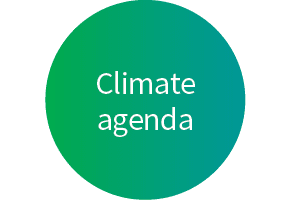


Read
Hear
Experts

Brian Lawson
Kevin Bourne
Susan Farrell
Living up to the Paris Agreement
Episode 81: Sovereign level ESG in Latin America
How the climate agenda is likely to play out across regions and at the level of international institutions in 2021 represents a key focus. Will climate policy drive collaboration as we have seen with the Paris Climate Agreement or fragmentation as global players jockey to lead on the issue? The UN Climate Change Conference (COP26) scheduled to be held in November in Glasgow, Scotland (rescheduled from 2020 due to COVID) will provide an indicator of the direction of travel on these open climate questions.



Perceived threats to domestic industry, national security, and geopolitical considerations have prompted a reassessment in the technology policies of the United States, European Union, and India towards foreign participation, particularly from China.

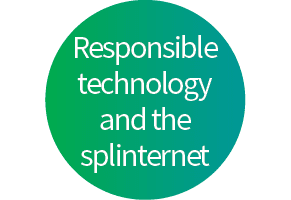
Watch

Deep Kumar
Keerti Rajan
Petya Barzilska

Experts
The ‘Splinternet’ – technology as a strategic
lever and target
The process of US-China decoupling further drew in the internet as a sphere for reconsideration, with EU and India increasingly designing their own internet policy regimes independent of the world’s two largest economies and driven by domestic objectives. In 2021 and the years ahead, we will see each of these players – the US, China, the EU and India – develop distinct internet models distinguished by their regulatory oversight including barriers for new domestic and foreign entrants, data privacy and localization regimes, net neutrality requirements and anticompetitive standards. And while high potential commercial losses suggest absolute technology splintering is unlikely, companies operating in these markets will be increasingly required to tailor operations to gain and retain access.





About IHS Markit
IHS Markit (NYSE: INFO) is a world leader in critical information, analytics and solutions for the
major industries and markets that drive economies worldwide. The company delivers next-
generation information, analytics and solutions to customers in business, finance and government, improving their operational efficiency and providing deep insights that lead to well-informed, confident decisions. IHS Markit has more than 50,000 key business and government customers, including 80 percent of the Fortune Global 500 and the world’s leading financial institutions. Headquartered in London,
IHS Markit is committed to sustainable, profitable growth.
customer care
north and south america
T
europe, middle east and africa
T
asia pacific
T
JAPAN
T
E

To learn more: riskintelligencesolutions@ihsmarkit.com
+44 1344 328 300
+604 291 3600
+81 3 6262 1887
CustomerCare@ihsmarkit.com
+1 303 858 6187 (Outside US/Canada)
+1 800 447 2273
ihsmarkit.com